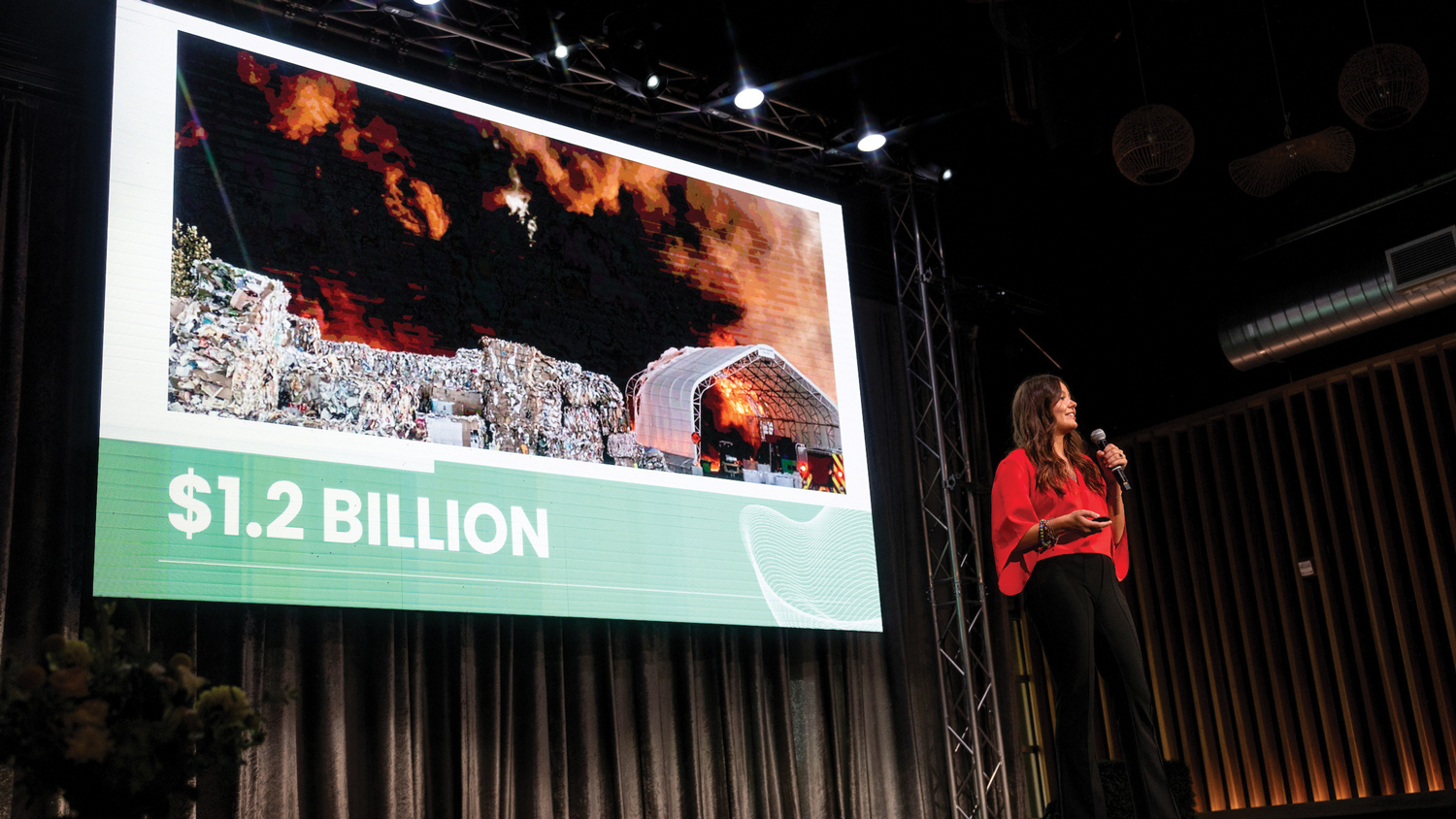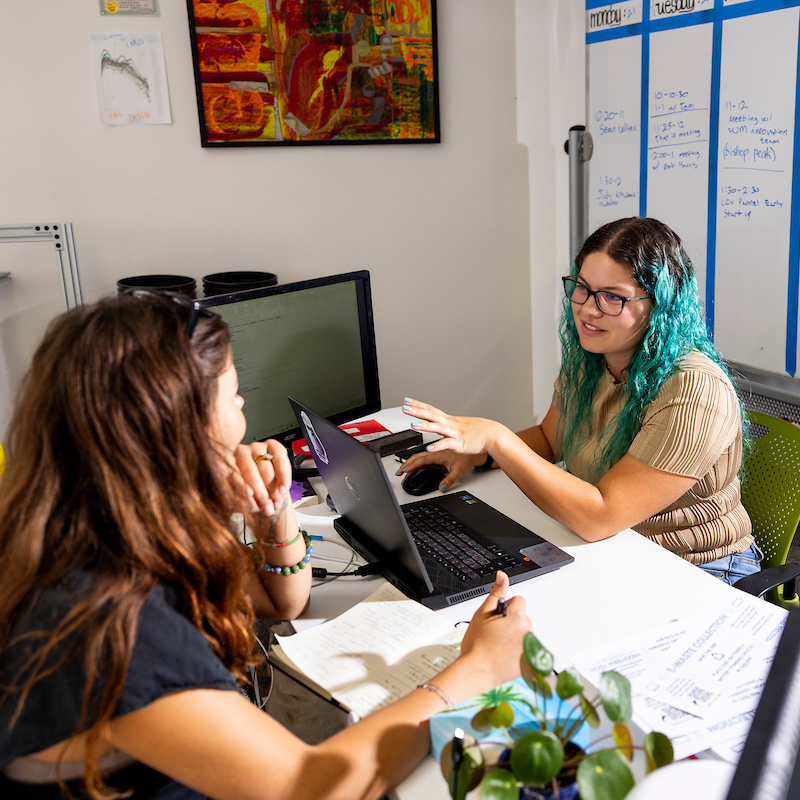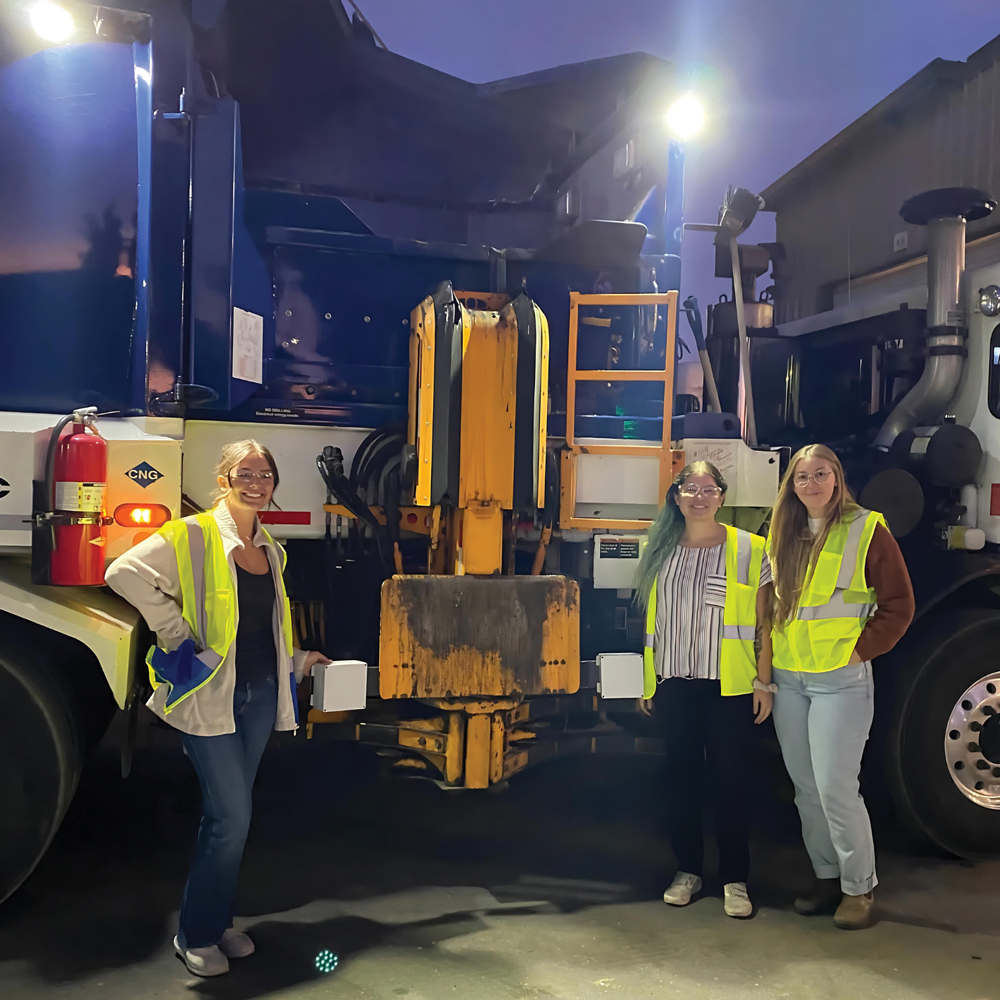
When most people recycle a cardboard box or metal container, they throw it in the bin, feel proud for going green, then forget about it. The Cal Poly alumni behind Nexstera Tech go further.
The startup is focused on a hurdle in the waste stream that threatens recycling facilities nationwide: lithium-ion batteries that cause major fires. Those batteries pervade personal electronics, including power tools, electric toothbrushes, kids’ toys and even musical greeting cards. Not only do the blazes halt operations, ruin materials and threaten workers, but they also cause over $1.2 billion in damages annually in the U.S. and Canada.
“Lithium-ion battery fires are projected to grow significantly in the next 10 years due to the increasing rise in battery-powered consumer electronic production,” said Penny Lane Case (Business Administration ’23), Nexstera Tech’s co-founder. “As they grow, we need to have proactive solutions, and that’s what this entire company stemmed from — there was no proactive solution on the market.”

Case (left) and James (right) work in the CIE HotHouse in 2023. Photo courtesy of the Center for Innovation and Entrepreneurship.
Case and Stefany James (Mechanical Engineering ’23) discovered this problem with their classmates in a collaborative design course during their senior year. The team members were initially drawn together because of their interest in sustainability. When they spoke to experts in the waste industry, they learned battery fires were undermining municipal recycling at an alarming rate. The team prototyped a tool that could scan materials in curbside bins before batteries made it into trucks or on the sorting facility floor.
James and Case led their idea through a series of support programs in the Center for Innovation and Entrepreneurship (CIE), starting with the Innovation Quest Competition and the 2023 Summer HotHouse Accelerator. That’s where they honed the concept of Nexstera Tech’s Pyrotack product, which scans waste with an AI-driven radar system that’s mounted to a recycling truck to identify different types of materials, currently focused on lithium-ion batteries. In less than a second, Pyrotack can tell the truck operator if a bin contains a battery and should be treated as hazardous household waste that requires different disposal.
As the Accelerator program culminated with its annual Demo Day pitch event, Nexstera Tech’s founders knew they were onto something big. Sitting in between friends and community members in the audience were three executives from Waste Connections, one of the largest sanitation companies in the nation. They flew in from across the country, eager to hear Case’s eight-minute pitch.
“It was true validation of everything we were working toward,” Case said of Demo Day. “Bringing this solution to market is solving a problem that is burning under this industry’s feet — literally and figuratively.”
After that milestone pitch, the startup joined CIE’s Incubator program, where it has been on a continuous path of hardware iterations, AI development, data collection, prototyping, fundraising, competitions, speaking engagements and tours of material recovery facilities.
The work we do now is laying the foundation for the impact we aspire to have on the world.
“The CIE has been instrumental in our growth, so we have prioritized giving back to this ecosystem,” said Case. “I find so much value in the program because it shows people that anything is possible.”
With Case as CEO and James as CTO, Kylene Landenberger (Computer Science ’24) joined the team as a co-founder and chief product officer to bolster Pyrotack’s development.

Case (left), James and Landenberger (right) test the Pyrotack system on a truck in San Luis Obispo. Image courtesy of Nexstera Tech.
“Kylene was the missing piece — the true race began once she joined the team,” said Case.
Nexstera Tech’s strong foundation helped it make the most of a surge in momentum. In less than a year, the startup exceeded its pre-seed funding goal, secured two new lab spaces and collected more than 25,000 material scans that sharpened Pyrotack’s ability to identify a battery amid chaos.
In May, Nexstera Tech hit another milestone when it earned $165,000 in funding at AngelCon, the Small Business Development Center’s investment event for Central California’s tech startups. The team’s pitch was the culmination of months of due diligence with the AngelCon Fund, which guided the team to build out a robust data room, leverage their network and tailor their story to new audiences.
“I never really thought about leading a business — I thought that I would just be a traditional engineer,” said James. “But through our path with Cal Poly, it has made me realize we can make innovative change in deep sustainability by creating our own entity.”
The horizon is vast for James, Case and Landenberger. The team is beta testing their prototype on trucks in San Luis Obispo and Oakland this fall with two major sanitation companies, but this is just the beginning. Nexstera Tech sees its unique non-invasive deep detection material identification technology extending past waste to aid safety and sustainability measures in security, agriculture, healthcare and beyond.
“Nexstera Tech’s mission exists on the edge of innovation, working to close existing gaps in leading research and uncover a world we cannot see with safe, legal, and cost-effective sensor solutions,” Landenberger said.
But in the short term, Nexstera Tech hopes that when a consumer recycles, they can have confidence the industry can do its part for the planet.
“We have a vision for the company, and we are determined to make that happen, but our deep-rooted purpose is much bigger than that,” Case reflected. “The work we do now is laying the foundation for the impact we aspire to have on the world.”


